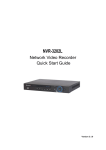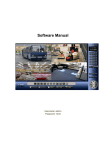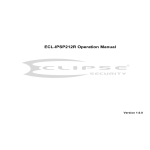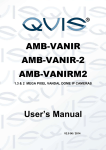Download G4-XLAHD DVR User Manual
Transcript
G4-XLAHD DVR User Manual Welcome ................................................................................................................................................1 Important Safeguards and Warnings .....................................................................................................1 Electrical Safety..................................................................................................................................1 Shipping Instructions ..........................................................................................................................1 Installation ..........................................................................................................................................1 DVR Repairs.......................................................................................................................................1 Environment .......................................................................................................................................1 Accessories ........................................................................................................................................1 Hardware Installation .............................................................................................................................1 Inspect the DVR Packaging and Check Contents .............................................................................1 Accessory Kit Contents ......................................................................................................................2 HDD Installation..................................................................................................................................2 Rack Installation .................................................................................................................................2 DVR Identification ..................................................................................................................................3 Front Panel .........................................................................................................................................3 Back Panel .........................................................................................................................................5 Connection Sample ............................................................................................................................6 Alarm/RS-485 Connection Block........................................................................................................6 Overview of Navigation and Controls ....................................................................................................7 Login, Logout & Main Menu ...............................................................................................................7 Login ...............................................................................................................................................7 Main Menu ......................................................................................................................................8 Logout .............................................................................................................................................8 Auto Resume after Power Failure ..................................................................................................8 Recording Operation ..........................................................................................................................9 Live Viewing....................................................................................................................................9 Status Icons ....................................................................................................................................9 Recording Setup (Schedule) ..............................................................................................................9 Schedule Menu...............................................................................................................................9 Manual Record Menu ...................................................................................................................10 Encode..........................................................................................................................................10 Snapshot.......................................................................................................................................11 Snapshot Image Storage..............................................................................................................12 Search and Playback....................................................................................................................12 Basic Operation ............................................................................................................................13 Network Setup ..................................................................................................................................15 Pan/Tilt/Zoom ...................................................................................................................................16 PTZ setup .....................................................................................................................................16 PTZ operation...................................................................................................................................16 Web Client Operation...........................................................................................................................18 Network Connection .........................................................................................................................18 Login .................................................................................................................................................18 Main Window ....................................................................................................................................18 Welcome Thank you for purchasing the G4-XLAHD series DVR. This manual will help you to become familiar with your DVR in a short period of time. Topics include hardware installation, cabling connections, web operations and general operating instructions such as system setup, record setup, backup operations, alarm setup and PTZ operations. Before installation and operation, please read the following safeguards and warnings carefully. Important Safeguards and Warnings Electrical Safety All installations and operations should conform to your local electrical safety codes. We assume no liability or responsibility for fires or electrical shock caused by improper handling or installation. Shipping Instructions When shipping, please use the original packaging and padding. This will protect your DVR under most circumstances. Installation Always handle electronic devices with care. Do not apply power to the DVR before completing the installation. Do not place objects on the DVR. It is recommended to always use a surge suppressor or power conditioning device. DVR Repairs Examination and repair work on the DVR should be done by qualified service engineers. Unauthorized repair work or modifications may void any warranty agreements. We are not liable for any problems caused by unauthorized modifications or repairs. Environment The DVR should be installed in a cool dry area away from direct sunlight. The DVR should also have sufficient ventilation. Accessories It is recommended to use accessories approved by the manufacturer. Before installation, please check the accessory kit to ensure all components are included. Contact your vendor before continuing if any components are missing. Hardware Installation Inspect the DVR Packaging and Check Contents Upon receiving your DVR please check for any visible damage to the external packaging. If the external packaging is damaged please document the damage and report it to the shipping agent. The protective materials used in packaging of the DVR will protect against most accidental damage during shipping and should be saved. Immediately after opening the box please check the items included in the accessory against the list in Table 1. Finally remove the DVR from the packaging materials. 1 Accessory Kit Contents One (1) power cable One (1) Ethernet cable Four (4) SATA II data cables One (1) external audio extension cable One (1) remote control One (1) USB mouse One (1) CD containing the DVR manual, client software and software tools One (1) package of HDD installation screws, rack mounting brackets, etc Note: The contents of the accessory kit are subject to change without notice HDD Installation If your DVR was ordered with a hard disk drive (HDD) preinstalled, you may skip this step. This procedure may also be used at a future date to add additional storage capacity to your DVR. Please refer to the User’s Manual for recommended HDD brands and models. Please follow the instructions below to install/add a HDD. Remove the top cover from the DVR. Align the HDD with the holes provided on the HDD bracket. Using four screws, attach the HDD to the bracket. Unfasten the HDD power cable. Attach the SATA cable to the HDD and to the system board. Attach the power cable to the HDD. Rack Installation The DVR will occupy two units of vertical rack space (2U). • Attach the rack mount brackets to the DVR using 3 screws each provided in the accessory kit. • Mount the DVR within the rack using 4 screws (not provided). • Always mount equipment within a rack from the bottom up. • If possible, it is advised to leave one rack unit of space between devices for ventilation. • Ensure that the temperature is below 95° Fahrenheit (35° Celsius). • Always ensure that sufficient power is provided for electronic components and that the power is conditioned using a surge protector or uninterruptable power supply (UPS). DVR Identification Front Panel The front panel of the DVR is displayed below. Please refer to the following table for front panel button and indicator information. Button/Indicator Icon/Label USB Port Power Indicator Remote Control Indicator Status indicator HDD status indicator Alarm indicator Channel recording indicators USB connection for mouse or external storage device. Power ACT Status When lit, remote control is active for this DVR. This indicator is not used. If lit, the HDD is in error status Alarm This indicator is not used. 1 - 16 When lit, the corresponding channel is recording. Press and hold to power up or shut down the DVR IR Shuttle (Outer ring) Jog (Inner ring) Escape Power indication light. HDD Power IR Receiver Function Esc Receives input from the remote control. • In monitor mode, clockwise will move forward one channel or set of channels and counter-clockwise will move backward one channel or set of channels. • In menu mode, clockwise will move to the next menu option and counter-clockwise will move to the previous menu option. • In playback mode, clockwise will cycle fast forward speed and counter-clockwise will cycle rewind speed. • In monitor mode, clockwise will cycle forward to the next window view mode and counter-clockwise will cycle to the previous window view mode. • In menu mode, clockwise will attempt to move down one menu option and counter-clockwise will attempt to move up on menu option. • In playback mode while paused, clockwise will advance slowly and counter-clockwise will rewind slowly. • In menu mode, return to the previous option or cancel the current operation. Enter Enter • In playback mode, return to monitor mode. • • • In monitor mode, brings up menu mode. In menu mode, selects the current menu option. In playback mode, executes the search using the current parameters. In monitor mode, the right arrow will move forward one channel or set of channels and the left arrow will move backward one channel or set of channels. In menu mode, the right arrow will move to the next menu option and the left arrow will move to the previous menu option. In playback mode, the right arrow will move to the next playback window and the left arrow will move to the previous playback window. In monitor mode, the up arrow will cycle forward to the next window view mode and the down arrow will cycle to the previous window view mode. In menu mode, the up arrow will attempt to move up one menu option and the down arrow will attempt to move down on menu option. In playback mode, the up arrow will change the current playback window to the previous channel, and the down arrow will change the current playback window to the next channel. • Left/Right arrow • • • • Up/Down arrow • Window view selector Alarm output control Manual record control Mult Alarm Rec Cycles the monitor view to the next window view mode. Brings up the Alarm menu. Brings up the Manual Record menu. In full screen monitor mode, brings up the Assist Function menu. • When entering text, used as a backspace key. • When used to configure motion detection masking, toggle the mask function on or off. • In the HDD Management interface, use to toggle between record times and capacity information. In playback mode, cycles through 4 speeds of slow playback. • Function assistant Fn Slow playback Fast forward Rewind/pause Play/pause Play previous Play next Numeric keypad 0-9 In playback mode, cycles through 4 speeds of fast playback. In playback mode, change to slow rewind or if already in slow rewind, pause playback. In playback mode, advance slowly, or if already advancing slowly pause playback. In playback mode, go to the previous search result file and begin playing. In playback mode, go to the next search result file and begin playing. • In monitor mode, bring the corresponding channel to single, full screen view. Use with -/-- to view channels 10 through 16. • In playback mode, switch to playback from the Shift Single/multiple screen selector -/-- corresponding channel for time period matching the search result. Use with -/-- to change to channels 1016. • When entering text, enters the numbers or text shown on the buttons. When entering text, cycle between lower case text, upper case text, numbers and special characters. • In monitor mode, used as a toggle to add “10” to the channel to be viewed in single full screen view. Example: pressing 3 brings channel 3 into single full screen view, pressing -/-- then 3 brings channel 13 into single full screen view. • In playback mode, used as a toggle to add “10 “ to the channel to be viewed for the time period matching the search result. Back Panel The rear panel of the DVR is displayed below. Please refer to the following table for rear panel details. Item Number 1 Description Power switch 2 Power cord input 3 Power supply fan 4 Individual channel loop outputs 5 Audio input for channels 1 through 4 6 Video input for channels 7 DB25 connector for audio cable connection for audio on channels 5 through 16 8 Audio output 9 Bidirectional audio device input port 10 Bidirectional audio device output port 11 10/100 Ethernet network port 12 eSATA external device connection port 13 RS-232 port 14 USB port for mouse or external storage device 15 HDMI video output port 16 VGA video output port 17 Alarm/RS-485 connection block 18 Composite video output port 19 Composite video matrix output port Connection Sample The following is a sample of devices that may be connected to your DVR. Alarm/RS-485 Connection Block The Alarm/RS-485 Connection Block is displayed below. Please refer to the following table for Alarm/RS-485 Connection Block information. Description Connection Label 1 – 16 Positive input lead from external alarm device. Device common ground. NO1/C1 – NO5/C5 NC5 CTRL 12V +12V A/B Normally open alarm output ports 1 through 5. Normally closed alarm output port. 12 Volt power output for external alarm device. External power input port for alarms. Power supplied should be less than 1 Amp. RS-485 communication connection for PTZ control, A is positive and B is negative. Overview of Navigation and Controls Before initial operation, please ensure that you have properly installed the HDD(s) and all cable connections. Login, Logout & Main Menu Login After the DVR boots up, the default video display is in multiple-window live display mode. Press Enter or left click the mouse to bring up the login interface. By default, the DVR has four accounts: Username: admin Password: admin (administrator, local and network) Username: 888888 Password: 888888 (administrator, local only) Username: 666666 Passwords: 666666 (Unprivileged user who can only monitor, playback, backup and etc.) Username: default Password: default (hidden user) You can use a USB mouse, front panel or remote control to input. When using the mouse input method, left click the characters. button to switch between numeric, upper case, lower case and special Note: For security reason, please modify password after you first login. Three account login failures within 30 minutes will result in a system alarm and five account login failures within 30 minutes will result in an account lock. Unlocking an account requires a system reboot. Main Menu After logging in, the system main menu is shown as below. There are a total of six icons: Search, Info, Setting, Backup, Advanced and Shutdown. You can move the cursor to highlight the icon and press Enter or left click the mouse to enter the sub-menu. Logout There are two ways for you to log out. The first one is from the Shutdown menu option. In the main menu, click the shutdown icon. The Shutdown interface will be shown as below. There are several options to choose from. The other way to log out is to press and hold the power button on the front panel for at least 3 seconds, this will stop all system operations. You may then click the power button on the front panel to turn off the DVR. Please note, before replacing the HDD, shut down the DVR and unplug the power cable. Auto Resume after Power Failure By default, the DVR will automatically write video files to disk and resume previous working status after a power failure. Recording Operation Live Viewing After powering the DVR on, the system will be in live viewing mode by default. The system date, time and channel names will be displayed by default. If you want to change system date and time, you can refer to general settings (Main Menu -> Setting -> General). If you want to modify the channel names, please refer to the display settings (Main Menu -> Setting -> Display) Status Icons The live preview screen may display the following icons for each channel. Recording This channel is being recorded Channel locked Viewing of this channel has been disabled for the default user Motion detection Motion has been detected on this channel Video loss No video input detected for this channel Recording Setup (Schedule) Note: You need to have proper rights to implement the following operations. Please make sure the HDDs have been properly installed. When the DVR is first booted up, it is in the default 24-hour continuous record mode. You can set the recording types and periods in the Schedule menu. Schedule Menu From the main menu highlight the Schedule icon and press Enter or left click the mouse to go to the Schedule menu. The following is a list of configurable values: Channel: Each input channel may be configured individually. Please select the channel number to configure or select “ALL” if you want to configure all channels identically. This field will display channel 1 by default. Week day: Each day of the week may be configured individually. There are eight options: Sunday through Saturday and “ALL”. This field will display the current day of the week by default. Pre-record: This value sets the amount of time to pre-record before a motion-detection or alarm event. Valid values are from 1 to 30 seconds depending on the bit stream. The default value is 4. Redundancy: This option is unsupported on the G4-HDE series DVR. Snapshot: This option is unsupported on the G4-HDE series DVR. Period 1 – Period 6: Up to 6 recording periods may be defined for each day. The sum of the defined periods should equal 24 hours and periods should not overlap. The default is one defined period of 24 hours (00:00 – 24:00). Record types: There are three recording types: regular (continuous), motion detection (MD) and Alarm. The default is regular (continuous) recording for Period 1 (00:00 – 24:00). Highlight the icon to select the corresponding function. After completing the setup click the save button and the system will return to the previous menu. At the bottom of the Schedule menu, a color bar is shown for your reference. A green bar represents regular (continuous) recording, yellow represents motion detection recording and red represents alarm recording. You may copy your defined parameters to another channel or weekday by pressing the Copy button, selecting the destination channel or weekday and then pressing the Paste button. Any modifications made on the Schedule menu will be abandoned unless the Save button is pressed. Manual Record Menu Right click the mouse and select Record or select Advanced -> Manual Record to go to the Manual Record menu. The selections from this menu are the highest priority for recording. There are three to select the option for the status options: Schedule, Manual and Stop. Highlight the icon corresponding channel. The following is a description of the configurable options: Manual: The selected channels will begin regular (continuous) recording after the OK button is pressed. Schedule: The selected channels will begin recording according to the configuration defined in the scheduled recording setup (Main Menu -> Setting -> Schedule). Stop: The selected channels will stop recording until this is changed to Schedule or Manual. Encode The Encode menu interface is shown below. The following is a list of configurable values: Channel: Select the channel you want to configure, the default is channel 1. Compression: Non-configurable, the default is H.264. Resolution: The G4-HD series DVR supports various resolutions that you can select from the dropdown list. Supported resolutions are D1/CIF/QCIF. Please note that the resolution options may vary based upon channel number. Frame Rate(FPS): You may select the value for Frames Per Second. Frames per second values may vary based upon channel number and resolution. Bit Rate Type: The G4-HD series DVR supports two bit-rate types: CBR and VBR. CBR stands for Constant Bit Rate which means the DVR will always use this bit rate without regard to the video image. VBR stands for Variable Bit Rate which means that the DVR will adjust the bit rate according to the video image, e.g. more motion or a more complex image will utilize a higher bit rate. If VBR mode is selected, you can set the video quality. Quality: There are six levels ranging from 1 to 6. The sixth level has the highest image quality. This option will only be displayed if VBR is chosen for Bit Rate Type. Bit Rate(Kb/S): The bit rate is defined as the maximum amount of information or detail, which is stored per unit of time of a recording. A higher bit rate will allow a better image to be produced but will use more resources such as HDD storage and network bandwidth. Audio/Video: You can enable audio for the main stream or video/audio for the extra (sub) stream. Video for the main stream is always enabled by default and is not configurable. For extra stream, enable the video first and then enable audio. Overlay: The overlay menu will allow you to create masks to block out portions of the image for privacy and also to define the location of the time and date and channel name labels on recorded video. Snapshot: The Snapshot menu contains four items: Mode, Image Size, Image Quality and Snapshot Frequency. Snapshot Snapshots are only used in conjunction with the FTP or Email functions and are not stored on the DVR. In the Encode menu click the Snapshot button to configure the snapshot mode, image size, image quality and frequency. Timing Mode: Timing mode will create a snapshot at a configurable interval. In the General menu configure the upload interval to define how often snapshots are uploaded to the FTP server. In the Schedule menu, enable the snapshot function. Please refer to the following figure for examples. Activation Mode: Activation mode will create snapshots based upon motion detection or alarm events. In the General interface configure the upload interval to define how often snapshots are uploaded to the FTP server. In the Detect menu enable the snapshot function for specified channels. In the Alarm menu enable the snapshot function for specified channels. Please refer to the following figure for examples. Priority: Activation snapshots have a higher priority than scheduled snapshots. If you have enabled both types, the DVR will perform the activation snapshot when an alarm or motion detection event occurs, otherwise the system will perform the scheduled snapshots. Snapshot Image Storage In the Network menu, you must configure FTP server information in order to store snapshots. You must enable the FTP function and then click the save button after entering the configuration information. Please refer to the User’s Manual included on the resource CD for detailed information. After enabling the scheduled snapshot or activation snapshot the system can upload image files to the FTP server. Input the FTP server information here. Search and Playback To open the playback window click the search button from the main menu. The playback interface is shown below. There are three file types to search for: • R: regular (continuous) recording file • A: external alarm triggered recording file. • M: motion detection triggered recording file The G4-XLAHD and G4-RTAHD series DVRs support all channel concurrent playback windows. Please refer to the following table for control reference. Number 1 2 3 4 5 6 7 8 9 10 11 12 13 14 Function Play Reverse Stop Slow play Fast play Previous frame Next frame Volume Previous file Next channel Next file Previous channel Search Backup Basic Operation There are multiple search parameters: video type, channel number and time. The DVR can display a maximum of 128 results for one search. Use the page up/down button if there is more than one page. Normal Playback Select the file name from the search results in the file list portion of the screen and press the enter button or double click on the file name to view file content. Playback Starting from Exact Time To begin playback from an exact time, Input the time (h/m/s) in the search parameters column and then click the play button. Synchronized playback function when playback During the playback process click on one of the numeral keys above the search results list, the system will switch to the corresponding channel video of the same time. Digital zoom When the system is in full-screen playback mode, use your mouse on the screen to select a section and then left click mouse for digital zoom. You can right click mouse to exit. File backup The DVR supports backup operations from the search results screen. Place a check mark (√) in the box to the left of the file name(s) in the search results list. Next, click backup button to proceed to the backup menu. Slow playback and fast playback Refer to the following table for slow and fast playback functions. Button Fast play button Slow play button ► Play/Pause Previous/Next ► Illustration In playback mode, click this button to switch between the 4 available fast playback speeds such and normal playback mode. In playback mode, click this button to switch between the 4 available slow playback speeds and normal playback mode. In slow playback mode, click this button to switch between play/pause modes. In playback mode, you can click and to view the previous or next video in current channel. Remarks Frame rate may vary due to different versions. Reverse playback and frame by frame playback Button Reverse play: button in playback interface. Illustration In normal playback mode, left click reverse play button, the system will begin reverse playback. Click the reverse play button again to go to pause mode. Remarks When system is in reverse play or frame by frame playback mode, you can click Manual playback frame by frame. Click pause button in normal playback mode, you can use │ and │ to view frame by frame. play button ► to go to normal playback. Note: All of the operations here such as playback speed, channel, time and progress are related to the DVR hardware version. Some series DVRs do not support some all listed functions or playback speeds. Network Setup To configure network information, select Network from Main Menu -> Settings. The following information can be configured: IP address: Enter the IP address for the DVR. DHCP: Used to acquire IP address information automatically. Use of DHCP to acquire a dynamic IP address is not recommended. TCP port: Default TCP communications port value is 37777. UDP port: Default UDP communications port value is 37778. HTTP port: Default HTTP (TCP) communications port value is 80. Max connection: The DVR can support a maximum of 10 concurrent user connections. 0 means there is no connection limit. Transfer mode: Select the priority between fluency/video qualities. Network download: The DVR will process network uploaded data first if you enable this function. Advanced setting: Please refer to the User’s Manual included in the resource CD for detailed information on these items. After entering network information click the save button. You will be returned to the previous menu. Pan/Tilt/Zoom Please note the following regarding pan/tilt/zoom (PTZ) setup and operation: Slight differences may be found in the user interface, due to various protocols. RS-485 cables must be connected to the “A” (positive) and “B” (negative) ports of the alarm block in order to have PTZ control. Configuration information should be configured on the PTZ prior to configuring your DVR. In order to control a PTZ with the DVR, switch the camera monitor channel to full screen mode for the appropriate window. PTZ setup The PTZ setup includes the following items. Please select channel first. Protocol: Select corresponding PTZ protocol such as PELCOD. Address: Input corresponding PTZ address. Baud rate: Select the baud rate. Data bit: Select the number of data bits. Default value is 8. Stop bit: Select the number of stop bits. Default value is 1. Parity: Select the parity. There are three choices: none/odd/even. Default value is none. After configuring all items click the Save button. You will be returned to the previous menu. PTZ operation In single window display mode right click the mouse, click the “Fn” Button on the front panel or click the “Fn” key on the remote control to open the menu. Click Pan/Tilt/Zoom, the interface is shown as below. Here you can set the following items: Click the Speed: value ranges from 1 to 8. Zoom Focus Iris and icons to adjust zoom, focus and iris. Click the directional arrows to control PTZ position. There are a total of 8 directional arrows. If you use remote control, you can only use four directions, up, down, left and right. You can click the Set button (or click REC button in the front panel) to set preset, tour, and pattern for the PTZ. You can click the Page Switch button (or click Fn button in the front panel) to change PTZ function interfaces. Web Client Operation Slight difference may be found in the interface due to different model DVRs or different firmware versions. Network Connection Before attempting to connect to the DVR with the web client, check the following items: The DVR and PC are connected to the network and can see traffic. The light on the network interface port of the DVR and PC should be flashing. The DVR and PC are configured with the correct IP information. Refer to network setup (Main Menu -> Setting -> Network). Use the ping utility from a command window (from the PC, press the Start button then select Run and enter cmd and press Enter) to confirm network connectivity. The syntax is ping ***.***.***.*** (* = DVR IP address). Usually the return time to live (TTL) value should be less than 255. Login Open Internet Explorer and enter the DVR IP address in the address column. For example, if your DVR IP address is 10.10.3.16, enter http://10.10.3.16 in the address column. The system will display warning information to confirm that you wish to install the webrec.cab control. Please click yes button. If you can’t install the ActiveX file, please modify your IE security setup (see User’s Manual for more information on this). After installation, the interface is shown as below. Input your user name and password (the default username is admin and password is admin) and press the Login button. Note: For security reasons, please modify your password after you first login. Main Window After logging in, you should see the main window. If the four video windows are not displayed in the center of the screen and you are using Internet Explorer 8, you need to view the page using Compatibility View (Tools -> Compatibility View from the IE top line menu). To open a channel, highlight one of the video windows by clicking on it and click the channel name on the left side. For detailed operation information, please refer to the User’s Manual.






























